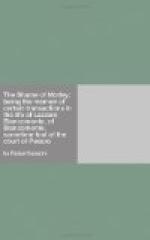I obeyed her readily, hat on head and cloak about me, lest my interests should suffer were my trade disclosed. I bade the man see to my horse, and then escorted by the woman, I made my way to the single room above, which, in obedience to my demand, she made haste to set at my convenience.
It was an evil-smelling, squalid hole; a bed of wattles in a corner, and in the centre a greasy table with a three-legged stool and a crazy chair beside it. The floor was black with age and filth, and broken everywhere by rat-holes. She set her noisome, smoking oil lamp on the table, and with some apology for the rudeness of the chamber she asked in tones almost defiant if my excellency would be content.
“Perforce,” said I ungraciously, perceiving surliness to be the key to the respect of such a creature; “a king might thank Heaven for a kennel on such a night as this.”
She bent her back in a clumsy bow, and with a growing humility wondered had I supped. I had not, but sooner would I have starved than have been poisoned by such foulnesses as they might have set before me. So I answered her that all I needed was a cup of wine.
When she had brought me that, and, at last, I was alone, I closed the door. It had no lock, nor any sort of fastening, so I set the three legged stool against it that it might give me warning of intrusion. Next I threw off my cloak and hat and boots, and all dressed as I was I flung myself upon my miserable couch. But jaded though I might be, it was not yet my intent to sleep. Now that the half of my journey was accomplished, I found myself beset by doubts which had not before assailed me, touching the manner in which this mission of mine was to be accomplished. It would prove no easy thing for me to penetrate unnoticed into the town of Pesaro, much less into the Sforza Court, where for three years I had pursued my Fool’s trade. There was scarce a man, a woman or a child in the entire domains of Giovanni Sforza to whom Boccadoro, the Fool, was not known; and many a villano, who had never noticed the features of the Lord of Pesaro, could have told you the very colour of his jester’s eyes; which, after all, is no strange thing, for— sad reflection!—in a world in which Wisdom may be overlooked, Folly goes never disregarded.
The garments I wore might be well enough to journey in; but if I would gain the presence of Lucrezia Borgia I must see that I arrived in others. And then my thoughts wandered into speculation. What might be this momentous letter that I carried? What was this secret traffic ’twixt Cesare Borgia and his sister? Since Cesare had said that it meant the ruin of Giovanni Sforza—a ruin so utter, so complete and humiliating that it must provoke the scornful mirth of all Italy—the knowledge of it must soon be mine. Meanwhile I was an agent of that ruin. Dear God! how that reflection warmed me! What joy I took in the thought that, though he knew it not, nor could come to know it, I Lazzaro Biancomonte, whom he had abused and whose spirit he had broken—was become a tool to expedite the work of abasement and destruction that was ripening for him. And realizing all this, that letter I vowed to Heaven I would carry, suffering no obstacle to daunt me, suffering nothing to turn me from my path.




